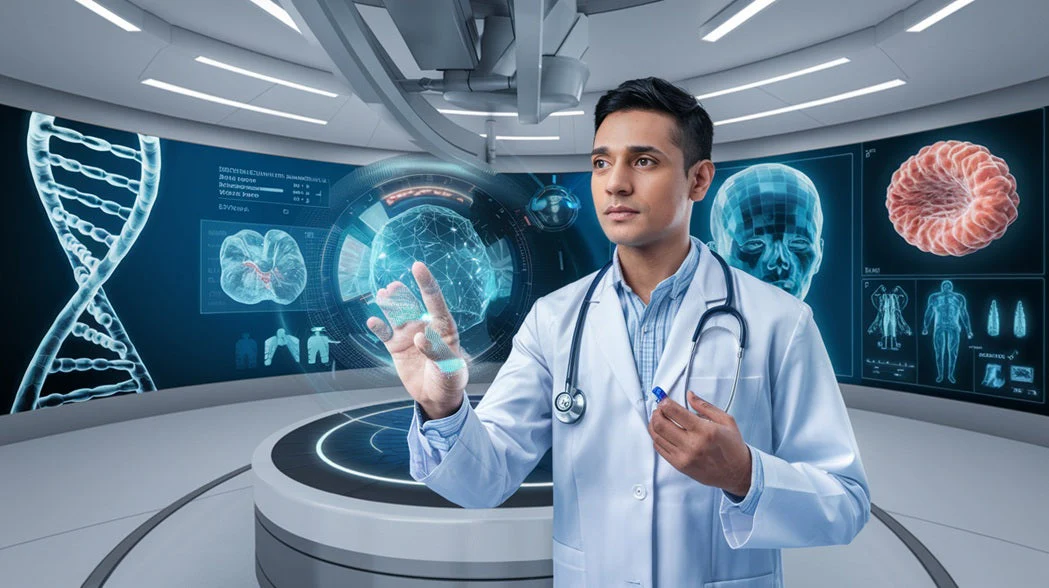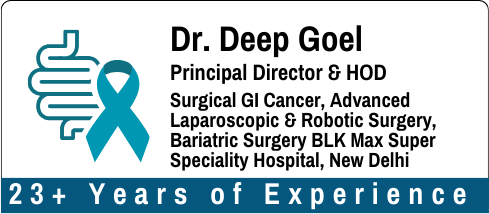AI in GI Cancer Care: Smarter Diagnosis & Treatment

The world of medicine is changing faster than ever, and nowhere is this transformation more profound than in the field of cancer care.
Today, Artificial Intelligence (AI), powered by deep learning and machine learning, is helping doctors detect, diagnose, and treat gastrointestinal (GI) cancers with greater precision, speed, and safety.
GI cancers, including those of the stomach, colon, liver, pancreas, and food pipe (oesophagus), are among the leading causes of cancer-related deaths worldwide. What makes them so dangerous is that symptoms often appear late, limiting treatment options. But AI is now helping rewrite that story.
Artificial Intelligence in GI cancer care is not only improving diagnosis but also revolutionising robotic surgeries and personalised oncology, providing patients with better survival outcomes and faster recovery times.
This blog examines how Artificial Intelligence is revolutionising GI cancer care, from early diagnosis and robotic-assisted surgeries to precision-driven, personalised treatments that are transforming outcomes and restoring hope for patients worldwide.
AI in GI Cancer Diagnosis
Early detection is critical in GI cancers, and AI is redefining how doctors identify cancer at its earliest, most curable stages.
According to recent studies, AI systems trained on thousands of endoscopic and imaging datasets can now match or even surpass expert doctors in identifying early-stage tumours.
- AI-assisted endoscopy: Deep learning (DL) and convolutional neural networks (CNNs) aid in detecting small or flat lesions during endoscopy, even those invisible to the human eye.
- Automated image analysis: AI analyses CT, MRI, and ultrasound scans in seconds, highlighting suspicious tissues and reducing diagnostic errors.
- Histopathology automation: Digital pathology slides are now scanned and interpreted by AI, which accurately identifies cancer cells and reduces reporting time.
“AI allows us to detect cancer early, plan surgeries with precision, and personalise treatment in ways that were unthinkable just a few years ago,” says Dr. Deep Goel.
A patient of Dr. Deep Goel shared, “I had frequent acidity and bloating, but routine tests showed nothing. At BLK-Max, Dr. Deep Goel used AI-assisted endoscopy, which detected a tiny early-stage stomach tumour that others missed. I underwent a quick laparoscopic surgery and was home in four days. Thanks to early AI detection and Dr. Goel’s expertise, my cancer was cured before it spread.”
AI and Robotic Surgery in GI Cancer
When surgery becomes necessary, AI plays an equally transformative role inside the operating theatre.
Robotic-assisted surgery, integrated with AI algorithms, is making procedures safer, faster, and more precise, particularly for cancers in delicate regions such as the stomach, liver, pancreas, or oesophagus.
How AI enhances GI cancer surgeries:
- 3D Visualisation and Planning: AI reconstructs patient scans into 3D models, enabling surgeons to more accurately map tumour boundaries and blood vessels before surgery.
- Microscopic Precision: Robotic instruments powered by AI remove tumours with millimetre accuracy while protecting healthy tissue.
- Predictive Alerts: AI systems track tissue movement and pressure in real-time, warning surgeons before complications arise.
- Reduced Human Fatigue: Unlike manual surgery, AI-assisted robotics minimises tremors and ensures steady performance during long operations.
This results in smaller incisions, less pain, faster recovery, and better survival outcomes.
“For complex liver or stomach cancer cases, AI-assisted robotic surgery allows us to operate with far greater accuracy and safety,” notes Dr Goel.
Another patient of Dr. Deep Goel shared, “When I heard I had a liver tumour, I was terrified. But Dr. Deep Goel assured me that AI-guided robotic surgery would make it safer and less painful. The precision was amazing; he removed the tumour without harming the rest of my liver. I was back to normal life in just two weeks. It felt like getting a second chance.”
Personalised GI Cancer Treatment with AI
Artificial Intelligence supports precision oncology, a new approach where treatment is tailored to each patient’s tumour biology rather than following a one-size-fits-all plan.
AI helps oncologists to:
- Identify molecular biomarkers such as microsatellite instability (MSI) or mismatch repair (MMR) status that guide therapy choices
- Predict which patients will respond best to chemotherapy, immunotherapy, or targeted drugs
- Combine data from imaging, pathology, and genomics to suggest the most effective treatment combinations
Recent studies have shown that AI systems can even forecast recurrence or metastasis after surgery, helping doctors design more effective preventive follow-up plans.
“AI allows us to make cancer treatment truly personal, focusing on what works best for each patient’s unique tumour biology,” Dr. Goel explains.
AI in Radiology and Pathology for GI Cancer
AI doesn’t just help detection; it can also certify, diagnose, and provide faster and more standardised diagnoses across hospitals.
- In radiology, AI algorithms can now distinguish between benign and malignant liver nodules with accuracy exceeding 90%, helping oncologists plan timely interventions.
- In pathology, AI tools can identify tumour regions and measure invasion depth on digital slides, cutting diagnostic time by half.f
- AI-based biopsy analysis can also predict prognosis and guide surgeons during procedures by indicating the extent of deep invasion.on
By integrating with digital hospital systems, AI ensures that diagnosis, imaging, and surgical planning happen seamlessly, reducing errors and improving treatment timelines.
AI and the Tumour Microenvironment
Understanding how AI interprets tumour-immune interactions is helping doctors predict who will benefit from new therapies, such as immunotherapy, especially for pancreatic and colorectal cancers.
Using advanced models, AI can:
- Analyse tumour–immune interactions to predict how a patient will respond to immunotherapy
- Evaluate features like tumour-stroma ratio and immune cell density, which influence prognosis
- Combine multi-omics data (genomic, proteomic, and imaging) to identify new treatment targets
These insights pave the way for next-generation, personalised cancer vaccines and therapies, tailored to the biological behaviour of each tumour.
How AI Benefits GI Cancer Patients
The impact of AI on GI cancer care is already evident in hospitals that are adopting these technologies. Patient’s experience:
- Earlier diagnosis and higher cure rates
- Minimally invasive robotic surgeries with faster recovery
- More personalised treatment plans with fewer side effects
- Accurate prognosis predictions for better follow-up care
- Enhanced safety through real-time surgical monitoring and predictive analytics
“Our goal is not just to extend life but to improve its quality, and AI helps us do that better than ever before,” says Dr. Goel.
Final Thoughts
Artificial Intelligence is no longer a concept of the future; it’s transforming how doctors diagnose and treat cancer today.
From AI-assisted endoscopy and robotic surgery to genomic analysis and treatment prediction, technology is providing oncologists with sharper tools to combat complex GI cancers with precision and confidence.
“The partnership between doctors and AI will define the future of cancer care,” concludes Dr. Goel. “It’s about combining human compassion with machine intelligence to give every patient the best possible chance at recovery.”
FAQs
1. Are AI-assisted or robotic surgeries more expensive?
They usually cost more than regular surgeries, but offer faster recovery, fewer complications, and shorter hospital stays, often balancing out the total expense.
2. Is AI safe to use in cancer treatment?
Yes, AI is entirely safe. It assists doctors with precision and real-time insights during diagnosis and surgery, while surgeons remain in complete control.
3. Can AI predict if my cancer will come back?
AI helps estimate recurrence risk by analysing medical data, enabling doctors to plan more effective follow-ups and early interventions, particularly for liver and stomach cancers.
4. How does AI detect cancer earlier than traditional methods?
AI analyses thousands of medical images in seconds, spotting tiny or hidden abnormalities that humans may miss, enabling earlier diagnosis.
5. Is AI useful for follow-up after cancer treatment?
Yes. AI tools can track imaging and lab data over time to identify early signs of recurrence or complications during follow-up visits.
Explore more blogs: Top 5 Advanced Treatments for Gastrointestinal Cancer in 2025

